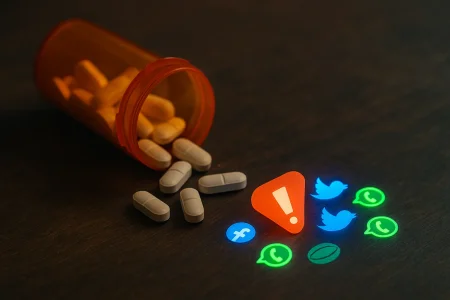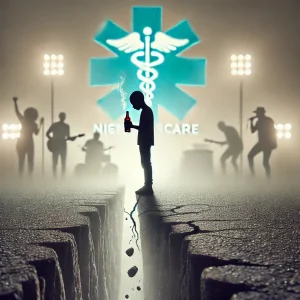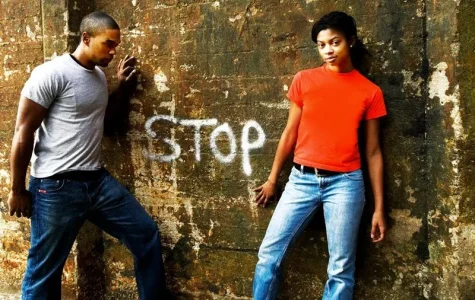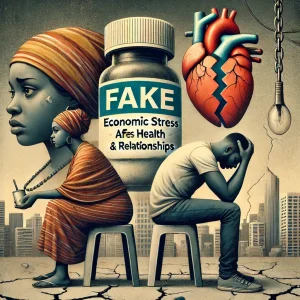Where Myths Travel Faster Than Medicine

Twitter has become Nigeria's unofficial pharmacy, dispensing remedies that range from questionable to deadly. While doctors struggle with underfunded hospitals and public mistrust, influencers with blue ticks are prescribing everything from bitter kola cocktails to prayer-only cancer cures. The result? A nation caught between traditional wisdom and digital snake oil, where viral lies often sound more convincing than medical truth.
The Psychology Behind the Panic
Why do we scroll past verified health officials but screenshot advice from lifestyle bloggers? The answer lies deeper than simple gullibility. Nigerian social media health advice taps into three powerful psychological triggers that formal medicine often ignores.
First, there's the accessibility factor. A video showing someone's grandmother mixing herbs feels more relatable than a clinical trial published in medical journals that most people can't access or afford. Second, traditional medicine carries cultural weight that Western-trained doctors sometimes dismiss too quickly. When official medicine feels foreign or condescending, alternative voices fill the gap.
Most critically, health misinformation thrives on hope wrapped in urgency. "Try this before it's too late" hits differently when you're watching a loved one suffer and formal treatment feels out of reach. The psychological appeal isn't stupidity; it's desperation meeting what appears to be accessible solutions.
How Did Social Media Kill More Nigerians Than Ebola Reached Our Shores?
During the 2014 Ebola scare, saltwater drinking killed more Nigerians than the actual virus did. Two people died from kidney failure while 20 others were hospitalised, all because they believed WhatsApp messages claiming salt water could prevent infection. The bitter irony? These deaths were entirely preventable, caused not by disease but by the speed at which fear travels through social media.
Research shows this wasn't an isolated incident. Studies found that 55% of health-related tweets during the Ebola crisis contained dangerous misinformation, spreading faster than health authorities could respond.
Why Do 97% of Nigerians Trust Vaccines But Not Healthcare Institutions?
Here's a puzzling contradiction: Nigeria has among the highest vaccine confidence rates globally, yet one in three Africans has no confidence in hospitals and health clinics. This trust paradox reveals something crucial about our relationship with health information.
We trust vaccines because community engagement worked. Years of grassroots education by trusted local leaders built genuine confidence. But institutional healthcare feels different—distant, expensive, and sometimes condescending. When government hospitals lack basic supplies and medical bills bankrupt families, alternative voices don't just sound appealing; they sound necessary.
Building Better Health Conversations
The solution isn't to shame people for seeking alternatives or dismiss traditional medicine entirely. Instead, we need health communication that respects intelligence while providing practical guidance.
Three concrete steps can help: verify the source by checking for relevant training and credible studies. Check for balance, as legitimate health advice acknowledges limitations and side effects. Finally, consult qualified practitioners before consuming anything promoted on social media.
The goal isn't perfect information; it's better judgment in an imperfect system where your health decisions matter more than anyone's follower count.
Sources:

Twitter has become Nigeria's unofficial pharmacy, dispensing remedies that range from questionable to deadly. While doctors struggle with underfunded hospitals and public mistrust, influencers with blue ticks are prescribing everything from bitter kola cocktails to prayer-only cancer cures. The result? A nation caught between traditional wisdom and digital snake oil, where viral lies often sound more convincing than medical truth.
The Psychology Behind the Panic
Why do we scroll past verified health officials but screenshot advice from lifestyle bloggers? The answer lies deeper than simple gullibility. Nigerian social media health advice taps into three powerful psychological triggers that formal medicine often ignores.
First, there's the accessibility factor. A video showing someone's grandmother mixing herbs feels more relatable than a clinical trial published in medical journals that most people can't access or afford. Second, traditional medicine carries cultural weight that Western-trained doctors sometimes dismiss too quickly. When official medicine feels foreign or condescending, alternative voices fill the gap.
Most critically, health misinformation thrives on hope wrapped in urgency. "Try this before it's too late" hits differently when you're watching a loved one suffer and formal treatment feels out of reach. The psychological appeal isn't stupidity; it's desperation meeting what appears to be accessible solutions.
How Did Social Media Kill More Nigerians Than Ebola Reached Our Shores?
During the 2014 Ebola scare, saltwater drinking killed more Nigerians than the actual virus did. Two people died from kidney failure while 20 others were hospitalised, all because they believed WhatsApp messages claiming salt water could prevent infection. The bitter irony? These deaths were entirely preventable, caused not by disease but by the speed at which fear travels through social media.
Research shows this wasn't an isolated incident. Studies found that 55% of health-related tweets during the Ebola crisis contained dangerous misinformation, spreading faster than health authorities could respond.
Why Do 97% of Nigerians Trust Vaccines But Not Healthcare Institutions?
Here's a puzzling contradiction: Nigeria has among the highest vaccine confidence rates globally, yet one in three Africans has no confidence in hospitals and health clinics. This trust paradox reveals something crucial about our relationship with health information.
We trust vaccines because community engagement worked. Years of grassroots education by trusted local leaders built genuine confidence. But institutional healthcare feels different—distant, expensive, and sometimes condescending. When government hospitals lack basic supplies and medical bills bankrupt families, alternative voices don't just sound appealing; they sound necessary.
Building Better Health Conversations
The solution isn't to shame people for seeking alternatives or dismiss traditional medicine entirely. Instead, we need health communication that respects intelligence while providing practical guidance.
Three concrete steps can help: verify the source by checking for relevant training and credible studies. Check for balance, as legitimate health advice acknowledges limitations and side effects. Finally, consult qualified practitioners before consuming anything promoted on social media.
The goal isn't perfect information; it's better judgment in an imperfect system where your health decisions matter more than anyone's follower count.
Sources:
- ABC News: Nigerian Ebola Hoax Results in Two Deaths (2014)
- World Economic Forum: Trust in Healthcare Analysis (2019)
- BMC Health Services Research: Nigerian Health Misinformation Study (2025)
- PubMed Central: Social Media Misinformation Research (2016)
- DataReportal: Nigerian Social Media Statistics (2024)




